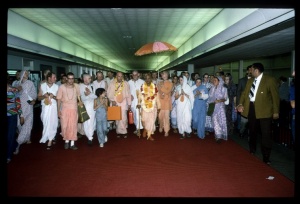CC Antya 8.9 (1975)

A.C. Bhaktivedanta Swami Prabhupada
Below is the 1996 edition text, ready to be substituted with the 1975 one using the compile form.
TEXT 9
- mahāprabhu kailā tāṅre daṇḍavat nati
- āliṅgana kari’ teṅho kaila kṛṣṇa-smṛti
SYNONYMS
mahāprabhu—Śrī Caitanya Mahāprabhu; kailā—did; tāṅre—unto him; daṇḍavat nati—offering obeisances; āliṅgana kari’—embracing; teṅho—Rāmacandra Purī; kaila—did; kṛṣṇa-smṛti—remembrance of Kṛṣṇa.
TRANSLATION
Śrī Caitanya Mahāprabhu also offered obeisances unto Rāmacandra Purī, who then embraced Him and thus remembered Kṛṣṇa.
PURPORT
Śrī Caitanya Mahāprabhu offered obeisances to Rāmacandra Purī in consideration of his being a disciple of Śrīla Mādhavendra Purī, the spiritual master of His own spiritual master, Īśvara Purī. When a Vaiṣṇava sannyāsī meets another Vaiṣṇava sannyāsī, they both remember Kṛṣṇa. Even Māyāvādī sannyāsīs generally remember Nārāyaṇa, who is also Kṛṣṇa, by saying oṁ namo bhagavate nārāyaṇāya or namo nārāyaṇāya. Thus it is the duty of a sannyāsī to remember Kṛṣṇa. According to smṛti-śāstra, a sannyāsī does not offer obeisances or blessings to anyone. It is said, sannyāsī nirāśīr nirnamaskriyaḥ: a sannyāsī should not offer anyone blessings or obeisances.